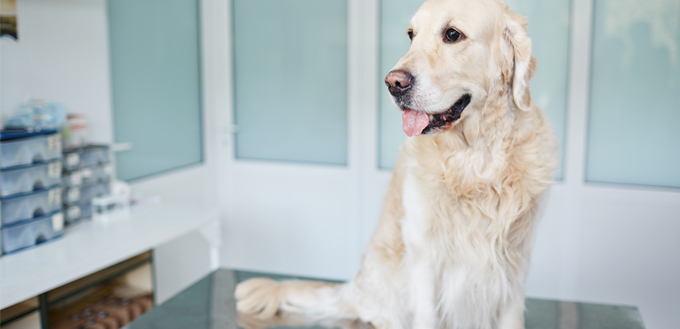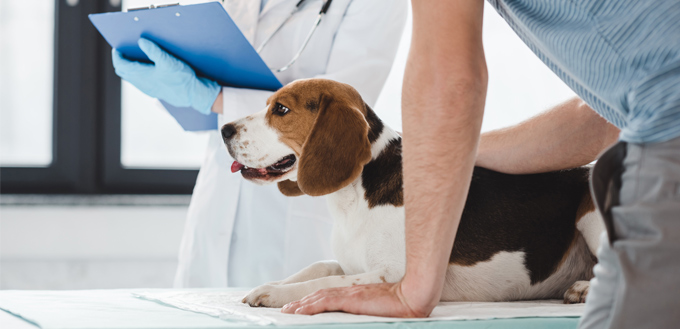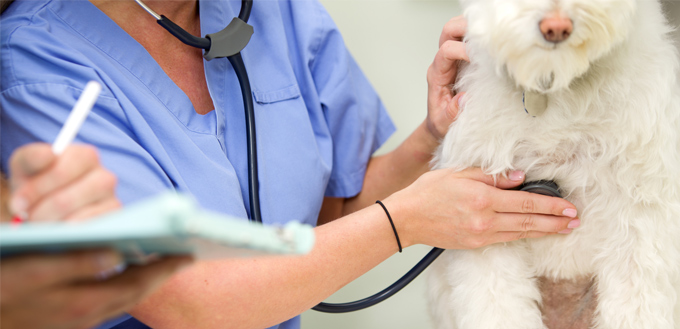For new dog owners and old veterans alike, it is always a good idea to take your puppy or dog to the vet on a regular basis. This can be for something as simple as a check-up and to have their regular inoculations done, to checking out a suspicious bump before the lump becomes something more sinister.
Of course, we all want to do everything we can for our furry friends but without the years of training that a vet undergoes, it can be hard to understand just what the plan of action is, or how to make your dog’s life better. Here, we’ve compiled a list of questions to ask your vet, to make the process of what can be a stressful visit much simpler. Meaning you get to focus on what matters- your four-legged pal!

What are We Doing Today?
Despite sounding somewhat obvious, it’s easy to get carried away in the moment, answer “yes” and “no” to any questions and leave without knowing what happened. If you’re not sure what your vet is checking for, or what the problem might be, ask your vet this question.
Even better, if you have gone to the vets with a specific purpose, you will appreciate the open answers that your practitioner should tell you. If you’re concerned about something, the vet should talk you through the procedure which will hopefully also put your mind at ease. Essentially, you’re creating a relationship with your vet, who you are trusting with your best mates wellbeing. Rather than finding you annoying (which is what most people fear when asking a professional for their opinion), your vet will know that you have a clear interest in the health and happiness of your pet, and will likely talk you through each check as they go through it.
Is My Pet at Risk of Any Illnesses?
This one is more for those who are new to their pet breed, or have never had a pet before. That said, veteran pet-owners can also be surprised at what their pet may be at risk of! With new information coming out regularly through extensive research, it’s always possible that a new vaccine may have been released or a new check can be undertaken.
For example, cocker spaniels are much more likely than other breeds to have issue with their ears and/or hearing, while German Shepherds can struggle with their hips later on in life. Learning the specifics of your pet’s likelihood of illness can mean preventative measures can be taken as early as possible. You should also be able to get the necessary checks done, while asking your vet for more advice about this.
Jabs and Inoculations
There’s a variety of jabs needed for all kinds of pets. With dogs and cats especially, it is important to start them off the healthiest way you can. Ask your vet which jabs are used to vaccinate against what, and check which ones you definitely need to “top-up” later down the line.
Most reputable rescue centres and breeders will give the first set of inoculations- and they usually include a voucher for the second set, to be given later on. Also, don’t forget that kennels and catteries are very unlikely to house your pet if they don’t have the correct papers and vaccinations. So make sure you get your proof of jabs and store them away, safely.
If you are planning on taking a break without your pet, ask your pet and boarder whether you need any added protection. Dogs are most likely to require an immunisation against kennel cough. Of course, if you plan on taking them with you, get them vaccinated against rabies before you head out!
Healthy Weight for My Pet
A lot of vets will weigh your pet during every exam, especially for younger animals. This is to ensure they are growing at a healthy rate. It’s always a good idea to ask your vet what the ideal weight is for your pet, since larger variations of this can usually signify problems later down the line.
As an example, if you know you are feeding your pet well and they are still losing weight, they may have a hormonal imbalance. Keeping an eye on this helps your vet rule out some of the most common issues, allowing them to get straight into conducting the necessary checks and tests- meaning your pet will likely receive their results faster and be treated much more quickly than without this information.

Best Food for My Pet
It’s always a good idea to get a good recommendation from your vet about the food you’d like to give to your pet. Different breeds may become healthier when using/eating different brands or ingredients. You might also notice that a lot of dog and cat food actually only has a small amount of animal “derivatives” (read: meat leftovers from human food), rather than a decent helping of nutrient-rich meats. Your vet may be able to guide you on whether or not this is suitable for your furry friend.
You and your vet will know your pet the best. You may notice if he or she is off their food or uninterested in any specifics of their food, so do inform them if you notice a change in their behaviour around food.
What Regular Meds Should I Use for My Pet?
For animals with specific medical issues, your vet will have most likely given you a prescription and some instructions. If you feel confused at any point, ask them (or their reception team) if they could write down these for you- it’s always better to be safe than sorry!
That said, medications are not just for curing illnesses. The majority of medicinal use in the animal community is for preventative measure. These include flea and worming treatments, ear mite medications and tick prevention. You local veterinary surgery will have information that is more specific to your pet’s breed and likelihood of medications.
What’s the Best Routine for My Pet?
This can sound a little odd but, like humans, our animal friends can thrive in an environment that is centred around routines. You may have noticed this yourself, since it’s likely you will have come home from work to find your pal waiting patiently for you. They may not be able to tell the time, but they can still work out exactly when mum and/or dad is back!
Some great routines that also help with their training are as simple as getting up at the same time each day to let them out, giving them a weekly brush (or more often, if required), having meals at a similar time to yourselves and (if you have a dog) taking them out for regular walks at around the same times each day.
Can you Recommend Any Training Schools?
Your local surgery is likely to have plenty of connections in this area- and they are also likely to have had plenty of patients who have tried and tested all the local training schools! Of course, you can always grab a list of suitable schools in your area and do your own research on which ones come highly rated and are most suitable for you and your pet.
The great thing about asking your vet is that they may even be able to get preferential rates for their customers, if they have an agreement with a local school. So be sure to ask your vet this question and see if you can save yourself some money.
Can You Please Itemise and/or Explain the Bill?
Most people don’t particularly enjoy asking for money, and it certainly can be awkward in most areas of life. That said, even though your vet may be doing a sterling job and providing a good service, it is always a good idea to get your vet bills itemised.
If nothing else, having your bill explained to you thoroughly can help when speaking with insurance companies about procedures your pet has had to undertake. Having an itemised bill can be a huge help when claiming back on an unexpected illness, as the paperwork can provide the majority of information required. This means you’ll be handling one less headache later down the line, when you’re already likely to be taking the time to ensure your furriest family member recovers well.

When Do I See You Next?
It can seem a rather obvious question. However, it is important to make sure that you don’t miss any follow up appointments with your vet. Especially if they’re due for a course of jabs, or need checking up following their recovery from a treatment they may have had to undergo. Asking your vet when you should see them next will also allow you to envisage a timeline in which your pet should be recuperating. This way, you’ll know if they’re behind schedule and whether or not you should be booking another appointment to make sure they’re healing fully and properly.
You should never worry about asking your vet these questions. They’re usually more than happy to help. In fact, many veterinarians welcome it! It shows that you’re truly dedicated to your best friend and helps to build up trust between you and your local surgery. Not to mention you’ll feel happier knowing exactly how to manage your pet, while leaving with a clear idea in your mind of the next steps you need to take!
More Pet Product Reviews
Dog Knee Braces
Sunscreens for Dogs
Dog Pill Shooter
Liquid Bandage for Dogs
Salmon Oil For Dogs
Dog Thermometers
Dog Flea Combs
Dog Tear Stain Removers
CBD Hemp Oil for Dogs
Paw Protection Waxes For Dogs






